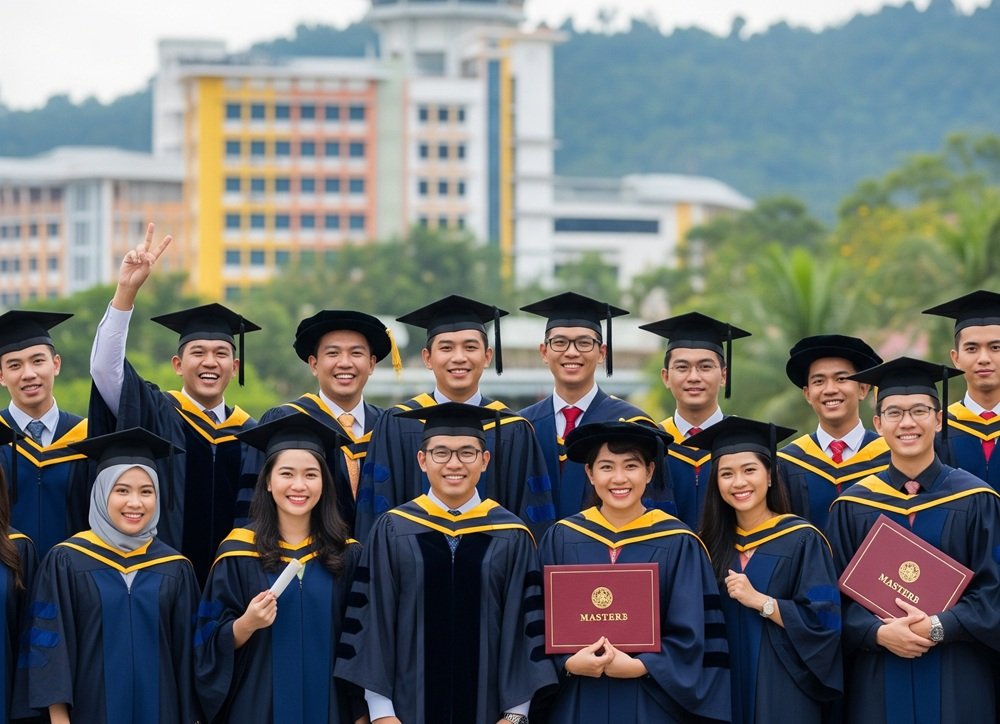Alright, so you’ve decided to study in Malaysia. Well, it’s a great choice!
The reason for us to say that is this Southeast Asian country is known for its culture, mouthwatering food, and world-class education system.
But before you arrange your things and book your flight, there’s one crucial step you need to clear out: which is the student visa application.
Unfortunately, not every student gets it right on the first try. Whereas some applications get rejected, and trust us, that’s not a fun email to receive.
However, the good news is that most rejections are avoidable if you know what to watch out for.
In fact, in this post, we’ll walk you through the top reasons why Malaysian student visas get rejected and, more importantly, how to avoid those red zones.
Table of Contents
ToggleCommon Reasons for Malaysia Student Visa Rejection
Let’s start by talking about the usual reasons behind visa rejections.
Trust us, these aren’t random or mysterious, as these are pretty simple.
Therefore, knowing these will help you to avoid making the same mistake again and again.
1. Incomplete or Incorrect Documentation
This one might sound like a silly mistake, but it’s worth talking about because it happens a lot.
Picture this: You’ve spent weeks gathering all the necessary documents, and you’re feeling confident about your application. But then, you accidentally skip attaching a single page of your academic transcripts or forget to sign a form. So, just like that, your application is incomplete.
Also, Malaysian immigration officers don’t have the time or resources to chase after missing pieces of your application.
Therefore, if something’s missing, unclear, or doesn’t meet their specific requirements, they’ll reject it without any hesitation.
For that reason, remember that even small errors—like submitting a document in the wrong format or failing to translate a non-English document—can lead to rejection.
Tip: Attention to detail matters. As in every single piece of your application needs to be perfect.
2. Insufficient Financial Proof
Let’s talk about money, a part that so many students have concerns about.
So, studying abroad isn’t cheap, and Malaysia wants to ensure that you won’t struggle financially while you’re there.
Therefore, they need to see solid proof that you can afford both your tuition and your day-to-day living expenses. In fact, this is where many applicants fall into the red zone.
For example, some students submit bank statements that show a balance below the required minimum.
While others might rely on vague promises of financial support from family members without providing official sponsorship letters. And then there are those who fail to include recent bank statements or use outdated documents.
Whereas all of these mistakes can lead to a quick rejection.
Remember that the authorities aren’t just looking for numbers—they want to see a clear, convincing picture of your financial stability.
Consequently, if your documents don’t meet that requirement, your visa application could be denied. So, make sure your financial proof is strong, up-to-date, and meets all the requirements.
3. Failure to Meet Academic Requirements
Malaysia takes education seriously, and its universities maintain high standards.
So, if your academic background doesn’t align with the program you’re applying for, your visa application could fall into the rejection category.
For instance, applying for a master’s degree in engineering without a relevant bachelor’s degree—or with grades that don’t meet the program’s minimum requirements—could signal that you’re not a good fit.
Keep in mind that it’s not just about having the right qualifications—it’s about proving that you’re ready for the academic rigor of the program.
In fact, Malaysian immigration officers want to ensure that students who are coming into the country are genuinely prepared to succeed in their studies.
For that reason, if your application suggests otherwise, your visa could be at risk.
4. Suspicion of Fraud or Misrepresentation
This one is serious. If the authorities suspect any part of your application is dishonest—whether it’s fake academic certificates, unrealistic work experience, or misleading financial documents—they won’t hesitate to reject your visa.
In a worst-case scenario, they might flag your application, which could affect future attempts to enter Malaysia as well.
Speaking of which, fraud comes in many forms.
In fact, some applicants submit forged transcripts or diplomas in the hope that no one will notice.
On the other hand, others exaggerate their financial situation or claim scholarships they haven’t actually been awarded.
Therefore, kindly note that even a small lie, like fudging the dates on your employment history, can come back to serious issues.
Tip: Be honest. This is because submitting accurate information is the only way to build trust with the visa authorities. As a matter of fact, remember, they’ve seen it all, and they know how to spot red flags.
5. Previous Visa Violations
If you’ve had trouble with visas in the past—whether in Malaysia or another country—you might find yourself facing extra attention from the authorities.
Speaking of which, overstaying a visa, working illegally, or violating visa conditions can leave a mark on your record.
Plus, even if the violation happened years ago, it could still count against you.
On that account, immigration officers take these violations seriously because they want to ensure that students coming to Malaysia will respect the rules.
Whereas if your record shows a history of non-compliance, they might assume you’re likely to do it again.
That’s why it’s crucial to address any past issues upfront and, if possible, provide explanations or evidence that demonstrates you’ve learned from your mistakes.
6. Weak Statement of Purpose (SOP)
Your SOP is more than just a letter—it’s your chance to highlight your intention and convince the visa officer that you’re a serious candidate.
Unfortunately, many students treat it as an afterthought. As in, they write simple essays, fail to explain their motivations clearly, or don’t connect their goals to the program that they’re applying for.
Trust us, a weak SOP can raise doubts about your intentions.
For example, if you say you want to study business in Malaysia but your academic background is in art history, the visa officer might question whether you’re truly committed to the program. Or if your SOP is full of typing and grammatical errors, it could suggest that you didn’t put much effort into your application.
Therefore, take your time to write a thoughtful, well-structured SOP.
Tip: Explain why you chose Malaysia, why you’re passionate about your field of study, and how this program fits into your long-term goals. Also, make it personal, natural, and compelling.
7. Health or Security Concerns
Finally, let’s talk about health and security checks.
These are standard procedures for most visa applications, and Malaysia is no exception.
Whereas if you fail the medical exam—for example, if you test positive for a contagious disease—you could be deemed ineligible for a visa.
Similarly, if you have a criminal record or are flagged for security reasons, your application could be rejected.
Now, while these issues are less common, they’re still worth mentioning.
This is because if you have a pre-existing medical condition, make sure you disclose it and provide the necessary documentation. And if you’ve had legal trouble in the past, consult an immigration expert to understand how it might impact your application.
Suggested Read:
How to Avoid Malaysian Student Visa Rejection
Now that we’ve covered the common reasons for rejection, let’s talk about how to avoid those.
Spoiler alert: It’s all about preparation and attention to detail.
Double-Check All Documents
This one is actually as simple as it sounds, but it’s worth repeating.
So, before you hit “submit,” go through every document with a clear mind.
Plus, make sure everything is complete, signed, dated, and meets the requirements.
Moreover, ask a friend to review your application too, as in they might catch something you missed. And if you’re unsure about a specific document, reach out to your institution or the Malaysian embassy for clarification.
Show Strong Financial Proof
Proving you can afford your studies is crucial.
Therefore, gather all the necessary financial documents, like bank statements, scholarship letters, bank balance confirmation letters, FD certificates, or sponsorship agreements.
In addition to that, make sure these documents are up to date and clearly show the required amount.
Note: If someone else is sponsoring you, include an affidavit or a letter from them by stating their commitment.
Write a Convincing SOP
Your SOP should be clear, concise, and realistic.
In fact, talk about why Malaysia is the perfect place for you to achieve your academic and career goals.
Also, be specific about the university and program that you’ve chosen.
Tip: Avoid childish statements like “I want to study in Malaysia because it’s beautiful.” Instead, focus on how the program aligns with your ambitions. And please, proofread it multiple times. This is because typing and grammar mistakes can make a bad impression.
Apply Through a Reputable Institution
Choosing the right university matters.
This is because applying through a well-known and accredited institution can boost your credibility.
With that being said, remember that Malaysian authorities trust these schools for their standards in every aspect.
Plus, they often provide guidance on the visa process, which can save you a lot of trouble.
Documents Required for a Successful Malaysia Student Visa
Alright, let’s talk about it: the documents you’ll need to submit.
Here’s a quick breakdown of the paperwork:
- Passport: Make sure it’s valid for at least six months beyond your intended stay.
- Offer Letter: This is the official acceptance letter from your university.
- Financial Proof: Bank statements, scholarship letters, FD certificates, balance confirmation letters, or sponsorship agreements.
- Health Records: A medical report and vaccination certificates.
- Academic Certificates: Transcripts, diplomas, or degrees relevant to your program.
Note: Double-check the specific requirements with your institution or the Malaysian embassy, as these might change depending on your situation.
What to Do If Your Visa Gets Rejected?
Okay, first of all, be calm. Getting rejected can demotivate you, but it’s not the end of the world.
Here’s what you should do next:
- As the first step, find out why your visa was rejected. The rejection letter should give you some insight. Was it due to missing documents? Insufficient funds? And then, once you know the reason, you can address the issue.
- If the rejection was due to a minor mistake, like incomplete paperwork, you might be able to reapply right away. Therefore, fix the problem, gather the necessary documents, and resubmit your application.
- But if the rejection was more serious—like suspicion of fraud or insufficient funds—you’ll need to take extra steps.
- On the other hand, for financial issues, consider securing additional funding or a scholarship. While for fraud-related rejections, consult a legal expert or immigration advisor to understand your options.
Remember that reapplying after a rejection is possible, but timing matters. Therefore, wait a few weeks or months before submitting a new application. In fact, use this time to strengthen your case and ensure that everything is in order.
Applying for a Malaysian student visa doesn’t have to be stressful.
Understanding the common reasons for rejection and taking effective steps to avoid those can significantly increase your chances of success.
Anyway, remember, the key is preparation. Therefore, double-check your documents, prove your financial stability, write a strong SOP, and choose a reputable institution.
On the other hand, even if things don’t go as planned and your visa gets rejected, don’t lose hope.
Learn from the experience, address the issues, and try again.
This is because studying in Malaysia is an incredible opportunity, and with the right approach, you can make it happen.
Contact TEVS a Malaysia student visa agency in Sri Lanka for more details.
FAQ
Incomplete or incorrect documentation comes on top of the list. Therefore, make sure that everything is accurate and complete before submitting.
Yes, you can reapply. However, make sure to address the reason for the rejection first, then submit a new application after a reasonable waiting period.
It usually takes around 4 weeks, but it can change depending on the time of year and your location. Therefore, start early to avoid last-minute stress.
It depends. Minor issues like incomplete paperwork won’t have a lasting impact, but serious problems like fraud can affect future applications.
It’s not mandatory, but a reputable agent can guide you through the process and help you to avoid mistakes. Anyway, just do your research to ensure that they’re trustworthy.







